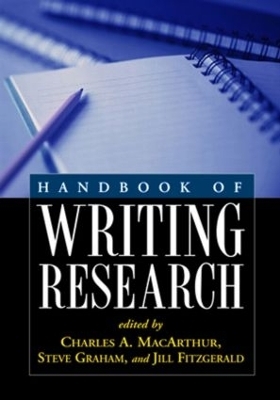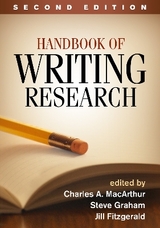
Handbook of Writing Research
Guilford Publications (Verlag)
978-1-59385-190-3 (ISBN)
- Titel erscheint in neuer Auflage
- Artikel merken
Charles A. MacArthur, PhD, is Professor of Special Education in the School of Education at the University of Delaware. His major research interests include understanding writing development and difficulties, designing instruction for struggling writers, applying technology to support reading and writing, and understanding learning processes in inclusive classrooms. He is currently principal investigator of a federally funded research project investigating instruction in decoding and spelling for adult basic education students. He is editor of the Journal of Special Education. Steve Graham, EdD, is the Curry Ingram Professor in the Peabody College of Education and Human Development at Vanderbilt University. His research has focused on identifying the factors that contribute to writing development and writing difficulties, developing and validating effective instructional procedures for struggling writers, and using technology to enhance writing performance. He is the former editor of Contemporary Educational Psychology and the current editor of Exceptional Children. He is also the author, with Karen R. Harris, of Writing Better and Making the Writing Process Work, and the coeditor, with H. Lee Swanson and Karen R. Harris, of the Handbook of Learning Disabilities. Jill Fitzgerald, PhD, is Interim Dean and Professor of Literacy Studies at the University of North Carolina-Chapel Hill, where she has taught since 1979. Her primary research interests include literacy issues for multilingual learners and early literacy development in relation to literacy instruction reform efforts. She has received the American Educational Research Association's Outstanding Review of Research Award and (with George Noblit) the International Reading Association's Dina Feitelson Award for Research. She currently serves on the editorial boards of the Journal of Educational Psychology, Reading Research Quarterly, and Contemporary Educational Psychology
MacArthur, Graham, Fitzgerald, Introduction. Part I: Theories and Models of Writing. Nystrand, The Social and Historical Context for Writing Research. Hayes, New Directions in Writing Theory. Rijlaarsdam, van den Bergh, Writing Process Theory: A Functional Dynamic Approach. Prior, A Sociocultural Theory of Writing. Torrance, Galbraith, The Processing Demands of Writing. Part II: Writing Development. Tolchinsky, The Emergence of Writing. Berninger, Winn, Implications of Advancements in Brain Research and Technology for Writing Development, Writing Instruction, and Educational Evolution. McCutchen, Cognitive Factors in the Development of Children's Writing. Donovan, Smolkin, Children's Understanding of Genre and Writing Development. Hidi, Boscolo, Motivation and Writing. Pajares, Valiante, Self-Efficacy Beliefs and Motivation in Writing Development. Shanahan, Relations among Oral Language, Reading, and Writing Development. Part III: Instructional Models and Approaches. Graham, Strategy Instruction and the Teaching of Writing: A Meta-Analysis. Englert, Mariage, Dunsmore, Tenets of Sociocultural Theory in Writing Instruction Research. Beach, Friedrich, Response to Writing. Newell, Writing to Learn: How Alternative Theories of School Writing Account for Student Performance. MacArthur, The Effects of New Technologies on Writing and Writing Processes. Smith, Cheville, Hillocks Jr., "I Guess I'd Better Watch My English": Grammars and the Teaching of the English Language Arts. Pritchard, Honeycutt, The Process Approach to Writing Instruction: Examining Its Effectiveness. Part IV: Writing and Special Populations. Ball, Teaching Writing in Culturally Diverse Classrooms. Peterson, Influence of Gender on Writing Development. Troia, Writing Instruction for Students with Learning Disabilities. Fitzgerald, Multilingual Writing in Preschool through Twelfth Grade: The Last 15 Years. Part V: Methodology and Analytic Tools. Schultz, Qualitative Research on Writing. Abbott, Amtmann, Munson, Statistical Analysis for Field Experiments and Longitudinal Data In Writing Research. Sanders, Schilperoord, Text Structure as a Window on the Cognition of Writing: How Text Analysis Provides Insights in Writing Products and Writing Processes. Shermis, Burstein, Leacock, Applications of Computers in Assessment and Analysis of Writing. Huot, Neal, Writing Assessment: A Technohistory. Pugh, Frost, Sandak, Gillis, Moore, Jenner, Mencl, What does Reading have to Tell us about Writing?: Preliminary Questions and Methodological Challenges in Examining the Neurobiological Foundations of Writing and Writing Disabilities.
| Erscheint lt. Verlag | 26.1.2006 |
|---|---|
| Verlagsort | New York |
| Sprache | englisch |
| Gewicht | 992 g |
| Themenwelt | Schulbuch / Wörterbuch ► Wörterbuch / Fremdsprachen |
| Geisteswissenschaften ► Sprach- / Literaturwissenschaft ► Sprachwissenschaft | |
| ISBN-10 | 1-59385-190-1 / 1593851901 |
| ISBN-13 | 978-1-59385-190-3 / 9781593851903 |
| Zustand | Neuware |
| Haben Sie eine Frage zum Produkt? |
aus dem Bereich



